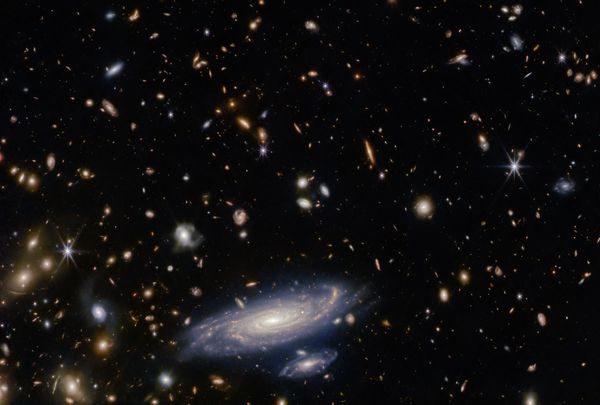
Astronomers believe the Milky Way is an estimated 13.51 billion years old. Yet many details of its life remain unclear, such as what happened during its infancy and what the galaxy was like as a so-called newborn.
This week, research published in Monthly Notices of the Royal Astronomical Society, provided astronomers with new details about a recently discovered galaxy, nicknamed "The Sparkler," which can be found in the constellation of Volans in the southern sky. The new observations have scientists comparing this younger galaxy, which is around 9 billion years ago, to our own when it was that age. In other words, this newly-discovered galaxy could have characteristics very similar to the Milky Way when it was merely a baby galaxy.
"We appear to be witnessing, first hand, the assembly of this galaxy as it builds up its mass – in the form of a dwarf galaxy and several globular clusters," said lead researcher Duncan Forbes in a statement. "We are excited by this unique opportunity to study both the formation of globular clusters, and an infant Milky Way, at a time when the Universe was only 1/3 of its present age."
As Forbes mentioned, the new galaxy is only 3 percent the mass of the Milky Way. But astronomers believe that it will grow to match the Milky Way's mass in the future. The European Space Agency first released an image of LEDA 2046648, which is the galaxy's scientific name, as its Picture of the Month on January 31, 2023.

"We were able to look back 9 billion years ago at this galaxy, and we could see, even 9 billion years ago they were already old, almost as old as old as the universe."
"The question is, 'Well, how did they get there?" co-author of the study, Aaron Romanowsky, told Salon.
"Is there some kind of exotic, early primordial form of star formation before the main part of our galaxy forms? This is a question that we've had for decades and there have been a lot of different ideas of answers to the question, but we haven't been definitively sure how these things formed."
Globular clusters are highly concentrated collections of around a million stars. Through the brightening effect of gravitational lensing — which is when light from a galaxy is diverted by a massive object en route to Earth — scientists were able to conclude that they were seeing The Sparkler around 9 billion years ago, which would be nearly 4 billion years after the Big Bang. Through this observation, Romanowsky said it was a "surprise" to see that the globular clusters were still really old in this young galaxy.
"We were able to look back 9 billion years ago at this galaxy, and we could see, even 9 billion years ago they were already old, almost as old as old as the universe, so that's a puzzle that's kind of come out of this work is that they're intriguingly old," Romanowsky said.
"Our galaxy is middle-aged right now, you could say we understand it's young adulthood, we understand it's adolescence, but it's really childhood we don't know much about and that's where the globular clusters come in."
However, as the James Webb Telescope collects more data it's likely that we'll have more answers. Indeed, one of the Webb telescope's primary goals is to explore what happened during the very early universe. By peering back into time, astronomers anticipate they'll have a better understanding of how our galaxy got to its current form today.
But for now, researchers remain perplexed.
As Romanowsky notes, discovery tends to lead to more questions. "When we get these kinds of observations, and that kind of feeds back into more ideas to request a turn of a telescope to keep looking or look at something different, there are lots of plans to pull this up and get more data on this type of object."







